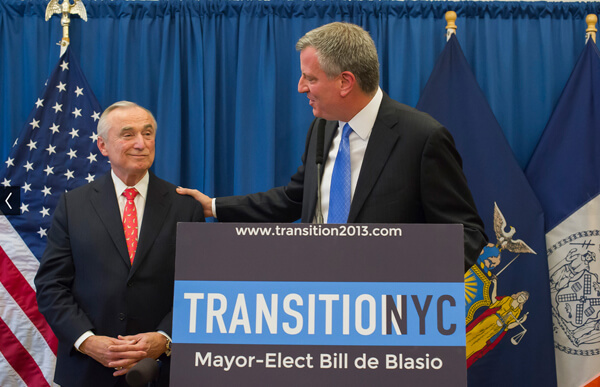Police departments in dozens of the largest US cities — including New York City and surrounding counties — are failing to establish appropriate public policies for dealing with transgender and gender non-conforming people, according to a new report commissioned by the National Center for Transgender Equality (NCTE).
NCTE’s sweeping two-year evaluation of department policies concluded that every police force studied lags badly on addressing trans-related issues. Even Washington, DC’s police department, judged to have the most comprehensive policies of all the cities on the list, instructs officers to record a trans person’s name only as an “AKA” if that name is different from their legal name. The department also does not outline policies for pronoun use and physical searches of individuals with non-binary gender identities or for whether a gender-segregated detention facility is appropriate for them. DC police officers are not required to undergo training on interactions with trans people.
Among the nation’s 25 largest police departments, there tend to be more established policies related to the treatment of people on the basis of sexual orientation than gender identity. But many departments are also failing in their respective policies surrounding gay folks: police department policies in Detroit, Phoenix, and Houston lack specific language banning discrimination on the basis of sexual orientation.
“On the 50th anniversary of the Stonewall riots, transgender people of color remain targets of harassment, abuse, and violence,” said Mara Keisling, NCTE’s executive director. “If we ever hope to end this crisis, police departments must evolve to meet the needs of the communities they have sworn to serve.”
The status of policies across the board is overwhelmingly discouraging. Only four departments have formal policies on access to hormone medications in detention facilities, while a mere nine of 25 police forces include gender identity/ expression language in their non-discrimination policies. There are also major gaps in their policies pertaining to using proper names and pronouns: just one of the 25 departments requires cops to record the name an individual is currently using and 18 of the 25 departments do not provide clear instructions regarding the recording of a person’s name.
Sixteen of the 25 departments do not outline search procedures for transgender people, while none explicitly provides a policy for transgender people to be transported with people who are of the same gender identity.
Regarding New York City, NCTE drew attention to the NYPD’s failure to clearly ban its officers from using gender identity or expression as a reason to stop, question, search, or arrest people. It also does not spell out how to address those who have non-binary gender identities. Officers are instructed to record the government-identified name of anyone they are arresting and department policy does not require the use of proper pronouns. According to the report, NYPD officers are directed to record names other than legal names as “preferred” names on the “Prisoner Pedigree Card” and “Prisoner Movement Slip” and to record those names as “Nickname/ Alias” under the “On-line Booking System Arrest Worksheet.”
Detective Carl Locke, Police Commissioner James P. O’Neill’s LGBTQ liaison, defended the department on numerous issues raised in the report, including its assertion that NYPD “policy does not require training on interactions with transgender individuals as part of officer training.” He said officers are required to undergo what he described as a “really intense” training on how to interact with people in the LGBTQ community and that cops must receive refresher training every time they are promoted.
“I know there is still more to do,” Locke said. “But I’m also proud that the current commissioner is committed to improving things.”
Locke dismissed the report’s point about the department not prohibiting the use of gender identity or expression as a basis to stop, question, and frisk an individual, saying, “Being trans is not a crime. It’s not a probable caused to be searched.”
When asked why department policy fails to mention non-binary identities, Locke admitted those policies are under review.
“We’re in the process and looking at whether the current policy needs to be amended in this area,” he said. “But our training is very explicit and clear that gender is not binary.”
Locke noted that names listed on government-issued IDs are always recorded but that officers will respect how an individual self-identifies.
“We are always going to refer to the person how they identify,” he said. “That’s their authentic self. We will use proper pronouns.”
Much of what Locke described is contrary to assertions made in the NCTE report, reflecting a difference between the department’s explicit patrol guide policies and how he says officers conduct themselves with members of the public. He suggested that those policies could possibly be made clearer and more detailed in the future.
“We’re constantly trying to make sure that our policies are the best that they can be,” he said. “There are ongoing discussions… I think it’s important to know that my position exists and if people feel mistreated, I’m here. I have direct access to the commissioner with an eye for policy.”
Other nearby police departments have more problematic policies on interactions with trans people — or none at all. The report states that Nassau County’s police department has no available policy on its treatment of LGBTQ individuals, while Suffolk County only has only a single policy — banning its officers from discriminating on the basis of sexual orientation.
Other large cities also have a long way to go to effectively implement policies pertaining to transgender people in custody. Houston’s department lacks basic policies pertaining to interaction with trans people and there are no policies explicitly banning discrimination against LGBTQ people. Los Angeles’ police department does not require training on interactions with trans people and its policies do not mention people with non-binary gender identities. Chicago similarly does not outline gender identity-based training policies and its policies require searches to be performed by a person of the same gender “as it appears on the individual’s government-issued identification card” instead of their gender identity.
NCTE’s highlighting of insufficient policies are backed up by reports of poor conditions for incarcerated trans folks. Just days before the NCTE report was released, attorneys representing transgender women in New York City said their clients have been housed in facilities inconsistent with their gender identity and that the city does not facilitate housing transfer requests in a timely manner. Complicating things further, the city’s Department of Correction is showing hostility to trans people in custody by voicing its opposition to a proposed task force dedicated to exploring the status of their incarceration.


































